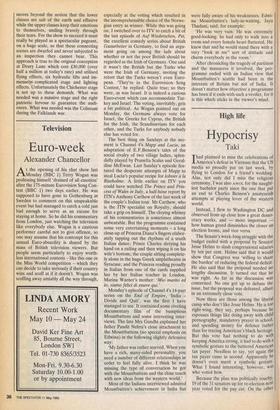Television
Euro-week
Alexander Chancellor
At the opening of his chat show last Monday (BBC 1) Terry Wogan was professing himself 'drained of all emotion' after the 175-minute Eurovision Song Con- test (BBC 1) two days earlier. He was supposed to have gone to Gothenburg in Sweden to comment on this unspeakable event but had managed to catch a cold just bad enough to serve as an excuse for staying at home. So he did his commentary from London, just watching the television like everybody else. Wogan is a cautious performer careful not to give offence, so one may assume that his contempt for this annual Euro-absurdity is shared by the mass of British television viewers. But people seem particularly to enjoy worth- less international contests – like this one or the Miss World competition – which they can decide to take seriously if their country wins and scoff at if it doesn't. Wogan was scoffing away amiably all the way through,
especially at the voting which resulted in the incomprehensible choice of the Norwe- gian entry as winner. While this was going on, I switched over to ITV to catch a bit of the last episode of Auf Wiedersehen, Pet, the excellent comedy series about British Gastarbeiter in Germany, to find an argu- ment going on among the lads about whether or not the poor British should be regarded as the Irish of Germany. One said it wasn't the British but the Turks who were the Irish of Germany, inviting the retort that the Turks weren't even Euro- pean. 'They're in the Eurovision Song Contest,' he replied. Quite true; so they were, as was Israel. It is indeed a curious Euro-event which can accommodate Tur- key and Israel. The voting, inevitably, gets a bit political. As Wogan pointed out on Monday, the Germans always vote for Israel, the Greeks for Cyprus, the British for the Irish, the Scandinavians for each other, and the Turks for anybody nobody else has voted for.
The best thing on Sundays at the mo- ment is Channel 4's Mapp and Lucia, an adaptation of E.F.Benson's tales of the social rivalry of two village ladies, splen- didly played by Prunella Scales and Geral- dine McEwan. Last Sunday's episode fea- tured the desperate attempts of Mapp to steal Lucia's popular recipe for lobster a la Riseholme. A little earlier on ITV you could have watched The Prince and Prin- cess of Wales in Italy, a half-hour report by ITN's Anthony Carthew of the last week of the couple's Italian tour. Mr Carthew, who is the ITN specialist on Royalty, should take a grip on himself. The cloying whimsy of his commentaries is sometimes almost unbearable. But the programme contained some very entertaining moments – a long close-up of Princess Diana's fingers elabor- ately tapping out the rhythms of a south Italian dance; Prince Charles dirtying his hand on a railing and then wiping it on his wife's bottom; the couple sitting complete- ly alone in the huge Greek amphitheatre in Syracuse; and the Princess reading proudly in Italian from one of the cards supplied her by her Italian teacher in London, Marina Warner's mother: `Mio marito ed io, siamo felici di essere qui.'
Monday's episode of Channel 4's 14-part series on the End of Empire, 'India – Divide and Quit', was the first I have managed to see. It contained some riveting documentary film of the bumptious Mountbattens and some interesting inter- views. The late Mrs Gandhi explained her father Pandit Nehru's close attachment to the Mountbattens (no special emphasis on Edwina) in the following slightly defensive way: 'My father was rather starved. When you have a rich, many-sided personality, you need a number of different relationships in order to feel fully alive. I think he was missing the type of conversation he got with the Mountbattens and the close touch with new ideas from the western world.'
Most of the Indians interviewed admired Mountbatten's achievement in India but were fully aware of his weaknesses. Edwi- na Mountbatten's lady-in-waiting, Jaya Thadani, said, for example: 'He was very vain. He was extremely good-looking: he had only to walk into a room and every female heart fluttered. He knew that and he would stand there with a very "look at me" sort of attitude and charm everybody in the room.'
After chronicling the tragedy of partition and the massacres it involved, the pro- gramme ended with an Indian view that Mountbatten's scuttle had been in the interests of Britain but not of India. It doesn't matter how objective a programme has been if it ends with such a verdict, for it is this which sticks in the viewer's mind.














































 Previous page
Previous page